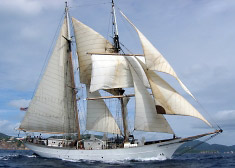2007 Rod Stephens Trophy Press Release
New York, N.Y., USA (January 15, 2008) – British sailor and ocean racer Mike Golding was selected by the Cruising Club of America to receive its 2007 Rod Stephens Trophy for Outstanding Seamanship for his heroic rescue of Alex Thomson in the Southern Ocean during the 2006 Velux 5 Oceans Race. The trophy will be presented at the club's annual Awards Dinner at the New York Yacht Club in Manhattan on January 15, 2008.
This is a perpetual trophy made possible by shipmates and friends of the late Rod Stephens to recognize “an act of seamanship which significantly contributes to the safety of a yacht or one or more individuals at sea.” Making the presentation of the award to Maureen Davis of ECOVER, Inc. on behalf of Mike Golding was CCA Commodore Ross Sherbrooke of Boston, Mass.
“"I am delighted to accept this prestigious reward,” said Mike Golding upon receiving the news of his selection. “The rescue of Alex Thomson from Hugo Boss was an incredible experience for both of us and something that I would like to think anyone in the same position would have done. Alex and I were located deep in the Southern Ocean competing on the Velux 5 Oceans Race solo around the world race, but when you take up the gauntlet of this type of racing we know the risks involved. We also know that we are each others best chance of rescue in such hostile regions. Whilst we are competing in a serious and professional yacht race, in such situations all competitive considerations have to be put aside in favor of straightforward human concern for our fellow sailor's wellbeing.”
The drama began on November 26 during the Velux 5 Oceans Race, deep in the Southern Ocean, 1000 miles to south east of Cape Town. ECOVER was sailing hard in strong winds and leading Thomson's boat Hugo Boss. Golding's close observations of the position polling of his near rival made him aware Hugo Boss had slowed from 19 knots to about 8 knots. Suspecting that his rival was in trouble he slowed ECOVER down, and then was informed that the top of Hugo Boss' canting keel had broken and was swinging loose. With a position 90 miles downwind and with darkness approaching, Golding set the boat up to retrace his course upwind into the big seas towards Hugo Boss' position, sailing into uncomfortable 35- 40 knots of wind. While crashing through freezing waves at 9 knots, Golding's ongoing problems with the fuel supply to his engine meant he had to set up an external fuel supply to the engine, which was sure to be needed for the pickup.
Conversing regularly with Thomson by satellite phone, the pair spent a considerable time discussing the options and the best method of retrieving the stricken English skipper. When he was close to the Hugo Boss position, he requested Thomson send up a flare. From that he identified Hugo Boss' masthead strobe light. They had always agreed that a pickup in the dark was absolutely too dangerous so both skippers prepared to wait for daylight by resting, eating and, in Golding's case, tinkering further with the engine to make it more reliable. The plan was for, not long after a watery dawn, Thomson to get into his life raft, pay out the painter (ie let out the rope fastening the life raft), then shoot a line to ECOVER using a line gun. Four attempts were required. The line gun failed, the engine shear pin broke, ECOVER's engine controls stuck, and – ultimately – the scary decision was taken for Thomson to cast himself adrift to give ECOVER more room to maneuver, but the pick up was made. Thomson's liferaft was winched alongside ECOVER. Within minutes he had to watch as he was forced to bid farewell to his boat for the last time.





